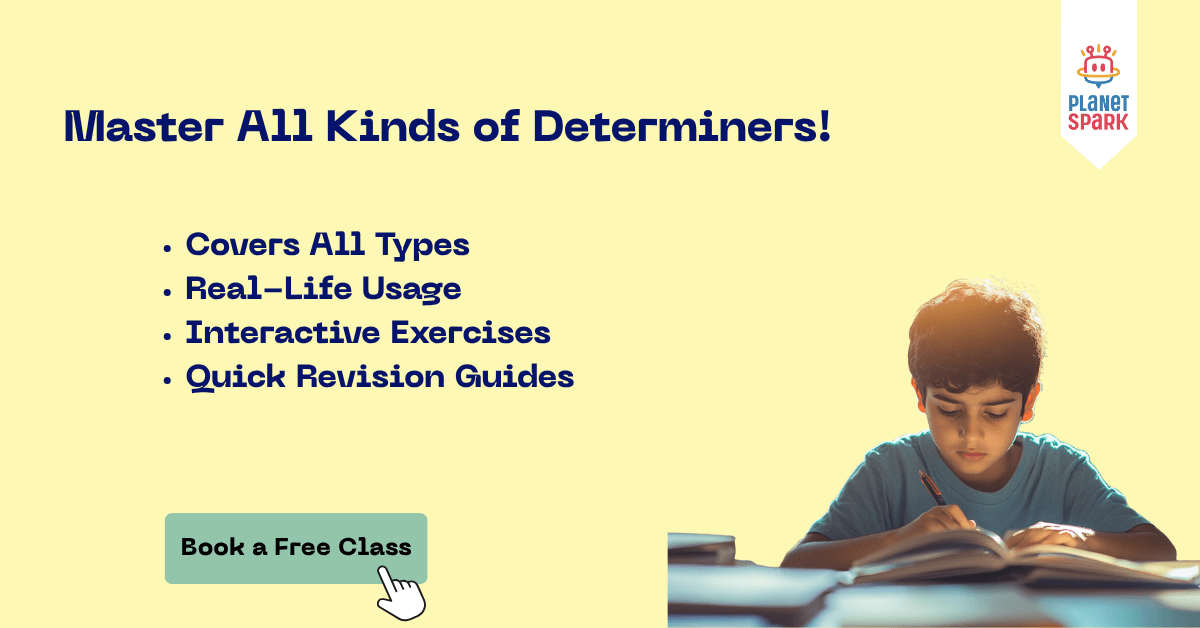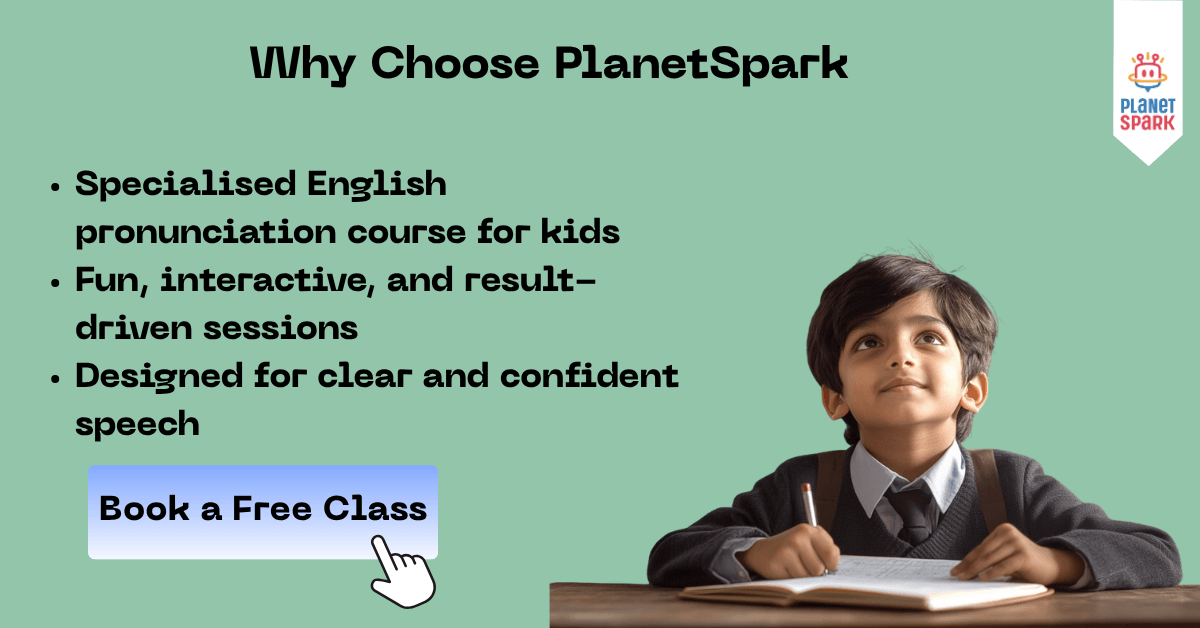Articles and Determiners in English Grammar with Examples
Last Updated At: 6 Oct 2025
12 min read

Table of Contents
- What Are Articles?
- Types of Articles
- What Are Determiners?
- Types of Determiners
- Difference Between Articles and Determiners
- Advanced Rules for Using Articles
- Rule 3: Articles and Adjectives
- Rule 4: Articles and Superlatives
- Rule 5: Using Articles with Countable and Uncountable Nouns
- Determiners in Context: Understanding Their Real Role
- Combining Articles and Determiners
- How Articles Impact Sentence Meaning
- Articles in Idiomatic and Fixed Expressions
- Summary of Advanced Concepts
- Articles and Determiners in Spoken English
- Common Errors in Using Articles and Determiners
- Tips to Master Articles and Determiners
- Exercises to Strengthen Your Article Skills
- Role of Determiners in Clarity and Tone
- Why Choose PlanetSpark?
One of the most commonly searched grammar topics by students, teachers, and parents is articles and determiners in English grammar. The reason is simple 3articles (a, an, the) and determiners (this, some, every, my, etc.) form the backbone of sentence construction. Without them, sentences sound incomplete or awkward. The search intent here is clear: learners want to know what articles and determiners are, how they are different, how they are used in sentences, and how to avoid common mistakes. Whether preparing for exams, improving writing skills, or strengthening communication, mastering articles and determiners is essential for achieving fluency and accuracy in English.
Before diving into the rules and examples, let’s outline what this blog will cover so you know exactly what to expect:
- Definition of articles and determiners with examples.
- Types of articles (definite, indefinite) and how to use them correctly.
- Types of determiners (possessives, quantifiers, demonstratives, distributives, interrogatives, etc.).
- Key differences between articles and determiners with examples.
- Rules and exceptions in using articles and determiners.
- Common errors students make while using them.
- Practical exercises to test understanding.
- Applications in writing and speaking on how articles and determiners improve fluency.
- Tips and tricks to remember usage rules easily.
By the end of this blog, you’ll not only understand articles and determiners but also learn how to use them confidently in both spoken and written English.

What Are Articles?
Articles are special words used before nouns to define whether they are specific or general. In English, there are only three articles: a, an, and the. Despite being only three, their correct use is extremely important because they change the meaning of sentences.
- I saw a dog in the park. (any dog, not specific)
- I saw the dog in the park. (a specific dog known to both speaker and listener)
Articles help make communication precise by telling us whether the noun being mentioned is general or particular.
Types of Articles
1. Indefinite Articles (A, An)
These are used before singular countable nouns when the speaker is referring to something general or not previously mentioned.
- I need a pen. (any pen)
- She saw an owl. (any owl, not a specific one)
Rules:
- Use a before consonant sounds (a book, a car, a university).
- Use an before vowel sounds (an apple, an hour, an honest man).
2. Definite Article (The)
This is used when referring to something specific or already known.
- The sun rises in the east.
- I read the book you gave me.
Rules:
- Used before unique things (the moon, the Earth).
- Used with superlatives (the best, the tallest).
- Used with the previously mentioned nouns.
Articles and determiners confuse many learners, but you don’t have to struggle alone! Join PlanetSpark to make grammar fun and easy.
What Are Determiners?
Determiners are words that come before nouns to give more information about the noun. They answer questions like: Which one? Whose? How many? How much?
Examples:
- This book is mine. (demonstrative determiner)
- My brother is here. (possessive determiner)
- Each student must submit homework. (distributive determiner)
Unlike articles, determiners form a larger group and include words like: my, your, some, many, all, this, that, every, several, each, etc.
Types of Determiners
1. Articles
Articles themselves (a, an, the) are also considered determiners.
2. Demonstratives
Words like this, that, these, and those point to specific things.
- This pen is blue.
- Those flowers are beautiful.
3. Possessives
Words like my, your, his, her, our, and their show ownership.
- My house is near the school.
4. Quantifiers
Words like some, many, few, and a lot of show quantity.
- She bought some apples.
5. Numbers
Numbers also act as determiners when they come before nouns.
- Two students are absent today.
6. Distributives
Words like each, every, either, and neither distribute nouns individually.
- Every child must participate.
7. Interrogatives
Words like which, what, and whose are used in questions.
- Which book do you want?
PlanetSpark’s Grammar Excellence Program teaches determiners and articles step by step.
Difference Between Articles and Determiners
Feature | Articles | Determiners |
|---|---|---|
Definition | Special words (a, an, the) used before nouns | Words before nouns giving more info |
Quantity | Only 3 | Many (my, this, every, some, few, etc.) |
Example | The cat is sleeping. | My cat is sleeping. |
Articles are a subset of determiners. All articles are determiners, but not all determiners are articles.

Advanced Rules for Using Articles
Once you understand the basic usage of a, an, and the, it’s time to move into the advanced grammar rules that often confuse even fluent speakers. Articles are not just fillers; they indicate specificity, countability, and context.
Rule 1: Using Articles with Proper Nouns
We generally do not use articles with proper nouns (names of people, places, or specific entities). However, there are exceptions:
The Ganga is a holy river.
The United States of America is a powerful nation.
We use the when a proper noun refers to a collective, a geographical region, or an institution.
Rule 2: Omission of Articles
Articles are omitted in certain situations, such as:
Before plural or uncountable nouns when speaking generally:
Books give knowledge.
Water is essential for life.
Before names of languages, meals, or sports:
She speaks English.
We have dinner at eight.
Knowing when not to use articles is as important as knowing when to use them.
Join PlanetSpark and learn expert shortcuts to master articles, determiners, and more.
Only a few seats left. Enroll today to boost your accuracy and confidence!
Rule 3: Articles and Adjectives
When an adjective modifies a noun, the article goes before the adjective, not after.
For example:
A beautiful flower (correct)
Beautiful a flower (incorrect)
If multiple adjectives describe a noun, one article is used for the entire phrase:
A tall, intelligent boy (correct)
However, when two adjectives describe different nouns, each takes its own article:
A red and a blue pen (means two pens) (correct)
A red and blue pen (means one pen that is red and blue) (incorrect)
Rule 4: Articles and Superlatives
Superlative adjectives (like best, most beautiful, largest) always take the definite article the:
The highest mountain in the world is Everest.
She is the most talented dancer in the group.
This rule highlights that superlatives refer to something unique or one of a kind within a group.
Rule 5: Using Articles with Countable and Uncountable Nouns
Articles are mostly used with countable nouns, but not with uncountable nouns, unless you specify a type or portion.
I need a cup of coffee. (specific portion) (correct)
I need a coffee. (incorrect because “coffee” is uncountable in general use) (incorrect)
When referring to categories or general ideas, no article is needed:
Music heals the soul.
Love is priceless.
Join PlanetSpark’s Expert Sessions today and get personalized guidance on article usage and writing accuracy.
Determiners in Context: Understanding Their Real Role
Determiners are not just about grammar correctness; they add clarity and tone to your message. For instance, compare these sentences:
I saw some cats in the alley.
I saw those cats in the alley.
The first sentence (some cats) sounds general, while the second (those cats) specifies which cats, showing how determiners help focus attention.
Similarly:
Every student must submit the form. (refers to all individually)
All students must submit the form. (refers to the group as a whole)
Though subtle, these differences greatly influence the meaning.
Combining Articles and Determiners
Sometimes, articles and other determiners appear together, but only in specific constructions. Usually, articles come before adjectives or nouns, while determiners like possessives (my, your, their) replace articles:
My book is on the table. (not The my book)
The boy with a red cap won the race.
However, combinations like all the, both the, or half the are valid:
All the students were present.
Half the team went home early.
Strengthen your grammar foundation before it’s too late!
How Articles Impact Sentence Meaning
Articles may seem like small words, but they can completely change the meaning of a sentence. Consider:
I need a pen. (any pen)
I need the pen. (a specific pen already mentioned or visible)
This difference reflects the definiteness and clarity about whether we are talking about something general or specific.
Similarly:
A teacher must be patient. (refers to any teacher in general)
The teacher must be patient. (refers to a specific teacher)
Such nuances enhance both writing quality and speech precision.
Articles in Idiomatic and Fixed Expressions
English includes many idioms and fixed phrases where article usage is traditional or non-standard:
In a hurry
At the moment
In the morning
Go to the cinema
Have a headache
Limited-time offer: Book your free trial today!
Even native speakers memorize these through repetition, as these phrases don’t always follow grammatical logic.
Join PlanetSpark and unlock powerful lessons on fluency, grammar accuracy, and confidence.
Summary of Advanced Concepts
By now, you’ve learned:
How articles and determiners provide context and specificity.
When to use, omit, or combine articles.
How articles affect meaning, tone, and precision in communication.
These are not just grammar rules; they’re tools that make your English polished and professional.

Articles and Determiners in Spoken English
Grammar rules often feel different in spoken English than in writing. In conversation, tone, familiarity, and context often determine how articles and determiners are used.
For example, native speakers naturally say:
Can you pass me the salt? because both speaker and listener know which salt is being referred to.
I need a spoon. because the object is not yet specific.
The choice between a and the happens instinctively with practice. However, for learners, consciously understanding the context makes a huge difference in fluency.
In spoken English, determiners also play a big role in expressing politeness and clarity:
Could you hand me that file, please? (specific)
Could you hand me some files? (general request)
These distinctions reflect the speaker’s intent, making your communication clearer and more professional.
Common Errors in Using Articles and Determiners
Even advanced learners make mistakes with articles, often due to interference from their native language or overgeneralization of rules. Let’s look at some common ones:
1. Using Articles with Uncountable Nouns
She gave me a homework. (incorrect)
She gave me some homework. (correct)
2. Using Articles Before Proper Nouns Incorrectly
The Mount Everest is tall. (incorrect)
Mount Everest is tall. (correct)
3. Missing Articles Altogether
I bought umbrella. (incorrect)
I bought an umbrella. (correct)
4. Using ‘The’ When It’s Not Needed
The life is beautiful. (incorrect)
Life is beautiful. (correct)
Each of these examples shows how omitting or misusing articles can alter meaning and fluency.
Tips to Master Articles and Determiners
Listen and Imitate:
Pay attention to how native speakers use articles in movies, podcasts, and news reports. Notice patterns when they use the and when they skip it.Practice Reading Aloud:
Reading aloud helps you naturally apply article rules. The more you practice, the more instinctive correct usage becomes.Write Short Paragraphs Daily:
Choose any topic and write 5–6 lines. Then, review and highlight your use of a, an, and the.Understand the Context:
Ask yourself: “Am I talking about something specific or general?” That question alone solves half of the article-related confusion.Use Flashcards or Grammar Apps:
Learning with examples like a university, an hour, and the moon builds quick recall.
Join PlanetSpark and learn through games, quizzes, and live mentor feedback.
Exercises to Strengthen Your Article Skills
Here are a few practice tasks to test what you’ve learned:
Exercise 1: Fill in the Blanks
Fill the blanks with a, an, or the:
I saw ___ elephant in the zoo.
She is ___ honest woman.
___ Ganga flows through India.
He wants to buy ___ new phone.
___ Earth revolves around the Sun.
(Answers: an, an, The, a, The)
Exercise 2: Identify the Error
Spot and correct the mistake:
She is a most talented singer.
He went to the school yesterday.
I have an umbrella and a bag.
(Answers: the most talented, went to school, correct as is)
Exercise 3: Create Sentences
Use each article correctly in your own sentence. For example:
a – I saw a butterfly in the garden.
an – She ate an apple this morning.
the – The book on the table is mine.
Regular exercises like these can significantly enhance your command of English grammar.
Role of Determiners in Clarity and Tone
Determiners do more than specify; they reflect tone, ownership, and scope.
My friend shows possession.
Every student implies inclusivity.
That book indicates precision.
Using the right determiner helps you convey exactly what you mean. In formal writing or academic essays, such clarity leaves a stronger impression.
Enroll in PlanetSpark and learn how articles and determiners make your stories flow better.
Articles and determiners are the unsung heroes of English grammar, tiny words that carry immense power. They decide who, what, and how specifically we’re talking about something. Whether it’s writing essays, giving presentations, or speaking confidently, mastering them ensures your message is always clear and professional.
By understanding the rules, exceptions, and contexts of a, an, and the, you not only improve your grammar but also your command over communication. Regular practice, careful listening, and expert guidance can make article usage second nature.
Why Choose PlanetSpark?
At PlanetSpark, we don’t just teach grammar; we build confident communicators.
Here’s what makes us different:
Live interactive sessions with expert mentors.
Personalized feedback to fix grammar errors instantly.
Gamified learning modules that make grammar fun and engaging.
Flexible learning schedules for students and professionals.
Courses designed for real-world communication, not just theory.
Join PlanetSpark today and transform your English skills into your superpower!
Limited-time offer enroll now and start your free demo class!
Frequently Asked Questions
Determiners are a broader category of words that come before nouns to clarify meaning, quantity, or ownership — including articles, demonstratives (this, that), quantifiers (some, many), and possessives (my, your).
Articles are a type of determiner that specify definiteness or indefiniteness of a noun.
Articles bring clarity and precision to language. They help listeners and readers understand which object, person, or idea is being discussed. Without proper article usage, sentences can sound incomplete or confusing.
Articles are words like a, an, and the used before nouns to show whether they are specific or general.
There are two types — definite article (“the”) and indefinite articles (“a” and “an”).
Avoid articles before plural or uncountable nouns when speaking generally, like Books give knowledge or Water is life.
Personalized Communication Report
Record a video to get a AI generated personalized communication report for your child
Select Learner's Class

Hi There, want to try these
tips for your child with
LIVE with our expert coach?
Let's check your child's
English fluency
